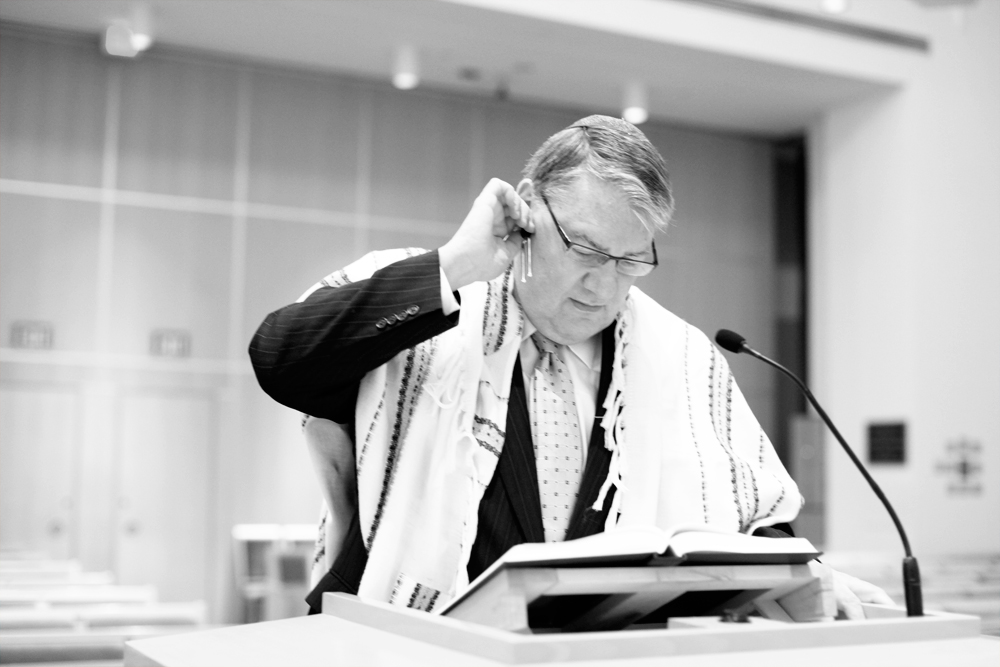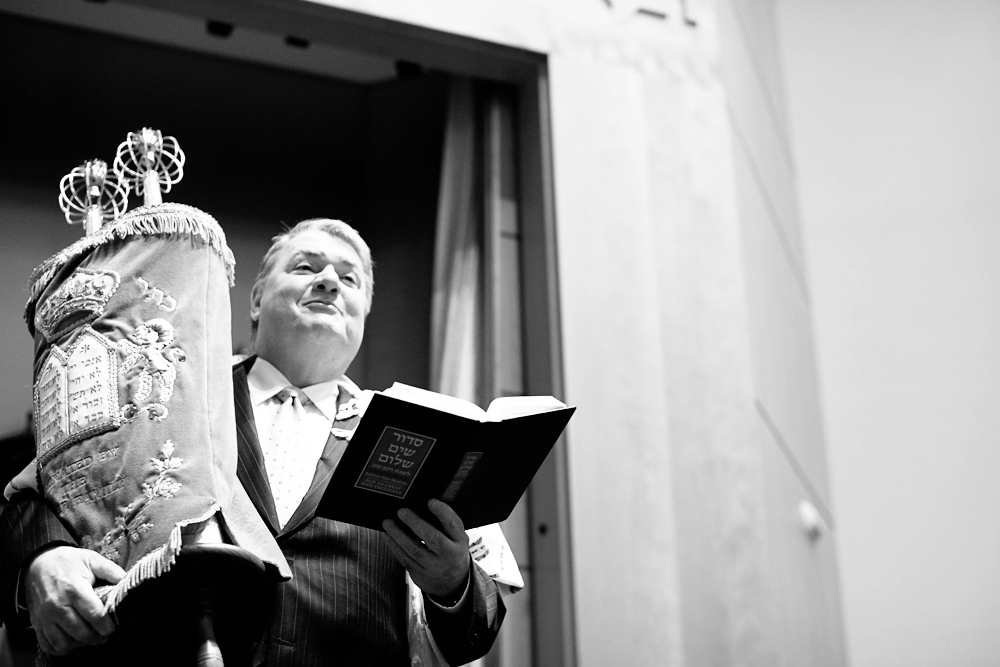The Vimaleh Boy
In March of ’56, I was playing the outfield in a game of punchball on the cement grounds of Etz Chaim Yeshiva of Brooklyn, a school for boys,when Perry Horowitz punched a moonshot in my general direction. I screamed, “I GOT IT! I GOT IT!!” at the same time as a car horn blared. I caught the “spaldeen,” turned, and saw my brother, the cantor, pulling up in his black-and-white Buick convertible with the red leather interior, leaning on his horn. “Shmuck!” he yelled. “Don’t ya know you got Vimaleh tonight?”
The so-called “golden age” of cantorial music fell approximately between 1890 and 1950. Those cantors, along with their choirs of boys and men, dominated the synagogue scene with their fabulous voices and over-the-top personalities. At weddings, when the bride and groom stood under the chuppah, a boy alto soloist, dressed in cantorial garb, would slowly walk down the aisle singing Vimaleh, a liturgical chant asking fulfillment of everyone’s wishes for the couple. The kid would then take off the gown and later in the ceremony would sing either “I Love You Truly” or “O Promise Me.” For this, he would get five bucks. Not a bad night’s work when hot dogs were a dime.
Scared shitless, I got into my brother’s car knowing I was going to get it big time from Tibby, my mom. I had screamed myself hoarse during the punchball game and had zero voice for the wedding. I got home, and sure enough, Tibby went berserk. She flexed her right index finger and shoved it between her upper and lower teeth, biting hard, a uniquely Jewish/Italian gesture. Normally, a belt would follow, but hoping to see me singing in public soon with an unmarked face, she picked up the phone and called Bogie.
Bogie was William Bogzester (pronounced Buckchester), a Viennese former cantor with whom I studied cantorial music and voice. Bogie was a five-foot-three, 300-plus-pound dandified eccentric of the highest order, who also was a brilliant and loving teacher. In short order, Bogie arrived at the house in full voice-teacher regalia. That is, patent leather shoes, over-the-calf socks with male garters, silk shirt with ascot, and brilliantly coiffed hair. He waddled over to the piano with young Mendelson in tow, proceeded to vocalize me through a few scales, and then pronounced, “JECKIE VEEL SING TONIGHT! YOU MUST GEEVE HEEM BLECK COFFEE VIS HONEY UND LEMON!”
Back in the ’50s, there was no decaf, so after about a half dozen of those suckers, I wasn’t sure about my voice but was definitely ready to rock and roll. So, off we went – mother, father, and heavily caffeinated ten-year-old – to Eastern Parkway and the Brooklyn Jewish Center, one of the great “cathedral” synagogues of New York. We found the organist, a wizened old pro named Morris Barash, and rehearsed, which consisted of him asking me what key, me saying D minor, and him saying, “We’re good to go.” On went the gown, tallis, and miniature cantor’s hat (miter), and I watched the wedding party march in, waiting for my cue. Facing me was one of the longest aisles of any shul in the country. The deal was, I walk slowly down the aisle as I’m singing and time it so I end up right in front of the bride and groom, lifting my arms in a priestly gesture as I finish the text. Right before my cue, the last thing I saw was Tibby giving me the look. That is: “I’m gonna shep nachas (derive pleasure) or else!”
Barash played the D minor intro and I started walking and singing:
VIMALEH fulfill (Not bad, the voice feels pretty good.)
MISHALOSENU our requests (That low note was a little rough.)
B’MIDO TOVO in good measure (Oy, I’m losing it.)
B’MIDO TOVO (My ass is grass.)
Y’SHUO V’RACHAMIM with salvation and mercy (Have mercy on ME.)
B’MIDO TOVO, B’MIDO TOVO (SHIIIIIIIIIT!)
Finally, with tears streaming down my cheeks, I croaked:
Y’SHUO V’RACHAMIM.
The bride and groom looked at me kindly, the father of the bride, not so kindly, and the photographer snapped a shot of me and whispered in my ear, “Kid, if I were you, I’d get the fuck outa here fast!”
I ran back down the aisle in my gown and tallis, straight out of the shul and onto Eastern Parkway. I kept running blindly while tearing off the gown and leaving it on the pavement. I ran until I had a stitch in my side and couldn’t run anymore. I found myself sitting on a stoop, my breath hitching, when seemingly hours later, the family Chrysler pulled alongside, my father got out, put his arms around me, and gently led me inside, where a contrite Tibby said, “I shouldn’t have made you do the Vimaleh, it’s my fault.”
We drove back home to Boro Park to the Famous Dairy Restaurant on 13th Avenue. My Dad and I ordered our favorite meal: double fries with a vegetarian Protose steak smothered in sautéed onions. This concoction was a fried substance that looked like dog food and tasted like meat. Heaven! All was forgiven.
About a week later I got a package in the mail. In it was a five-dollar bill and a Voit basketball from the bride and groom.
Fast forward fifteen years, I’m at my brother’s house in Long Beach shooting the breeze, when he gets a call from Irving Rogoff. Rogoff was a cantor/manager of cantors who was a family friend.
“Hey Rogoff!” my brother yells. “Ya wanna hear my kid brother sing a high B flat?”
So he gives me the phone and I scream a high note.
Rogoff says, “Hey kid! Ya remember a Vimaleh you did in the Brooklyn Jewish Center when you were hoarse?”
I say, “Sure, how could I forget. It was one of the most embarrassing moments of my life!”
He says, “I was the agent in charge of finding a Vimaleh kid that night. I call your brother and ask him if he knows anyone. He recommends you. After the ceremony, the father of the bride asks me if I’m responsible for the Vimaleh boy. I say yes. He hauls off and belts me in the face and knocks out one of my front teeth! Thanks kid…”




